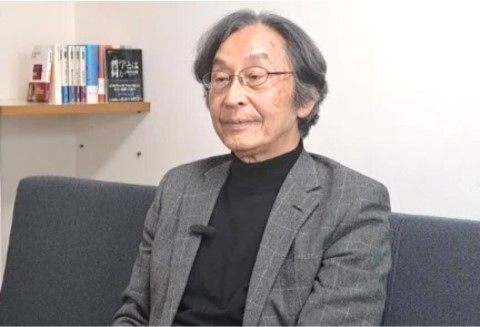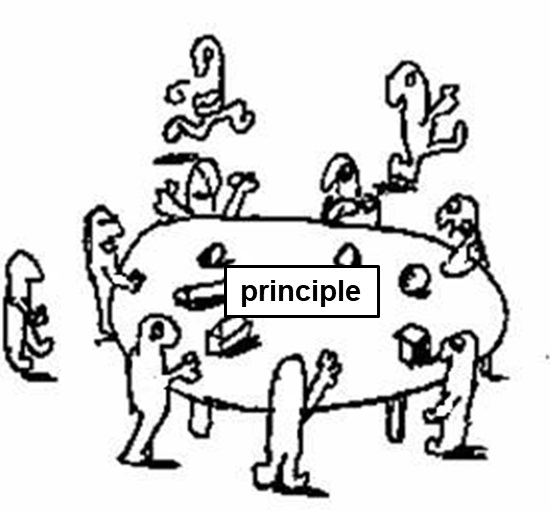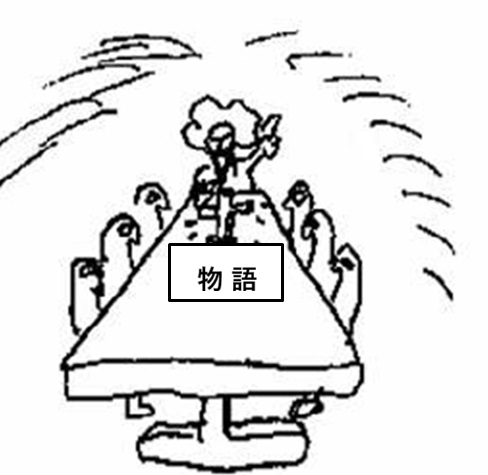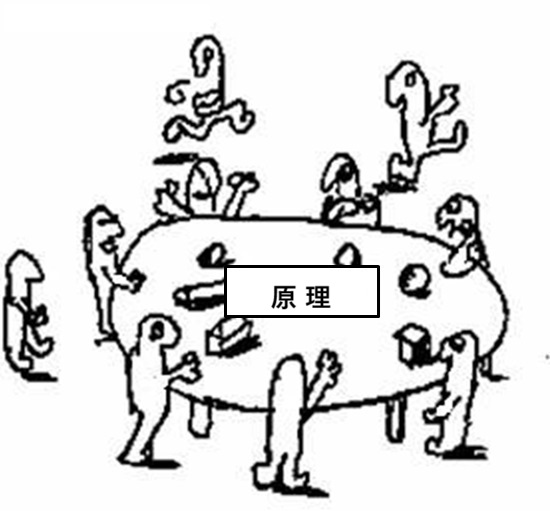Philosopical Essays
……Seeing the world through the telescope of philosophy

①Philosophical principle of war deterrence
〈4 Difference between religion and philosophy tables ①〉
〈4 哲学のテーブルと宗教のテーブル①〉
■Question
Indeed, understanding "why wars occur," in other words, "what are the conditions that lead to war," seems to provide clues for thinking about how to avoid them.
■質問
たしかに「なぜ戦争が起きるのか」ということ、つまり「戦争が起きてしまう条件がなにか」ということがわかると、それをどうしたら回避できるかということを考える手がかりができるように思います。
●Takeda
In the previous session, we discussed Hobbes's principle of universal war, that "mutual fear" is the root cause of the state of war in the human world, and therefore, the suppression of "mutual fear" is the fundamental principle of war prevention.
As we have already seen, various criticisms have emerged against Hobbes's idea. Some say this view is too pessimistic about human nature, or that Hobbes used this idea to justify monarchy.
Currently, the most powerful criticism seems to be that since war is essentially a conflict of interests between states, eliminating states is the most fundamental method to eliminate war. This view is shared by Marxism and subsequent postmodern thought. However, as we have seen, when surveying human history, this idea is representational (image-driven) and does not undermine Hobbes's principle at all.
●竹田
前の回に、ホッブズの普遍戦争の原理、「相互不安」が人間世界の戦争状態の根本原因であり、したがって「相互不安」の抑止が戦争抑止の根本原理、という話をしました。
すでに見ましたが、ホッブズの考えにいろいろ批判が出てきた。この考えは人間を悲観的に見過ぎているとか、ホッブズはこの考えで王政を正当化したとか。
いまのところ、最も強力に見える批判は、そもそも戦争は国家どうしの利害の争いだから、国家をなくすことが戦争をなくすための最も根本方法だ、という批判で、マルクス主義もそのあとのポストモダン思想もほぼこの考えです。しかし見たように、人間の歴史を通覧すればこの考えは表象的(イメージ先行的)なもので、とうていホッブズの原理をゆるがせません。
To repeat, Hobbes's answer to "why does war occur" can be called a philosophical "principle". Why can this be called a philosophical "principle", and why can a philosophical principle be called a "universal" answer? Regarding this, this time we will go back a bit in history and talk about the fundamentals of philosophical thinking.
繰り返すと、「なぜ戦争が起こるのか」に対するホッブズの答えは哲学的「原理」といえるものです。なぜこれが哲学的「原理」と言えるか、また、なぜ哲学的原理が“普遍的な”答えと言えるのか。 これについて、今回は少し歴史をさかのぼって、哲学の思考法の根本について話してみます。
It can be said that the fundamental role of religion and philosophy is "world explanation." Now, to explain the difference between the two, I have included figures of the table of religion and the table of philosophy.
宗教と哲学の根本の役割は「世界説明」だといえます。
いま両者の違いを説明するために、宗教のテーブルと哲学のテーブルの図をおいてみました。




① Religion Table
the table of religion is rectangular, with the religious founder at the far end. The founder is a person who tells about the "truth of the world." Around them are believers who have gathered, attracted by the founder's story. However, this is not an old religion, but a model of so-called revealed religions such as Buddhism or Christianity.
①宗教のテーブル
宗教のテーブルは長方形で、いちばん奥に教祖がいる。教祖はいわば「世界の真理」について物語る人です。回りにはこの教祖の語りにひかれて集まった信者たちがいる。ただ、これは古い宗教ではなくて、たとえば仏教やキリスト教などいわゆる啓示宗教のモデルです。
The founder explains the world to people through "stories" (myths or revelations). For example, at the beginning of the Old Testament is Genesis. This is a Jewish myth. It is written as follows. In ancient times, God created the world in 6 days, rested for one day, and then created man and woman. He let them live in paradise, but for some reason there was one tree with forbidden fruit. It was said that if one ate the fruit of the tree of knowledge, they would know good and evil. First, the woman ate it, then made the man eat it, and humans "knew good and evil" (lost their innocence) and fell. God became angry and punished humans. First, he took away humans' immortal destiny (originally created immortal), and further gave men the hardship of daily labor and women the pain of childbirth, it says.
教祖は、「物語」(神話、あるいは啓示)によって人々に世界説明をするのです。たとえば旧約聖書のはじめに創世記がある。これはユダヤ教の神話です。こう書いてある。太古、神が6日で世界を創り、一日休んだ後、男と女を創った。彼らを楽園に住まわせたが、なぜか一本の樹があり、禁断の木の実がなっている。智恵の木の実で食べると善悪を知るという。これをまず女性が食べ、つぎに男にも食べさせ、人間は「善と悪」を知って(無垢を失って)堕落した。神は怒って人間に罰を与えた。まず人間に死の運命(元は不死に創られていた)を、さらに男性には日々の労働の労苦と女性には産みの苦しみを与えた、とあります。
In this short "story," religion actually provides a clever explanation for the existence of the world and humans. That is, why does the world exist, why do humans live and suffer, why do people die, what happens after death... and so on.
この短い「物語」のうちで、宗教は、じつは世界と人間の存在について巧みな説明を与えています。
つまり、なぜ世界が存在するのか、なぜ人間は生きて苦しむのか、なぜ人は死ぬのか、死んだ後どうなるか……などです。
A renowned religious scholar named Mircea Eliade says this: "Religion gives people the meaning of the world through stories." This is exactly right. Why does religion give people the meaning of the world as a "story"? The biggest reason is to establish fundamental rules of sacred and profane, good and evil for the community. Every community needs fundamental rules of sacred and profane, good and evil. Without them, everything falls apart and order cannot be established. For this reason, a divine being is placed as an object of awe, and rules of sacred and profane, good and evil are established as God's commands. This makes people follow them.
ミルチヤ・エリヤーデという高名な宗教学者はこう言います。「宗教は物語によって、人々に世界の意味を与える」。まさしくそのとおりです。なぜ宗教は世界の意味を「物語」として人々に与えるのか。その最大の理由は、共同体に聖俗、善悪の根本ルールを立てる、 ということにある。どんな共同体も、聖俗・善悪の根本ルールを必要とします。それがないとみなバラバラになって秩序が定まらない。そのためとくに畏敬の対象として神的存在おき、神の命令として聖俗・善悪のルールを立てる。そのことで人々はそれを守る。
Among Moses' Ten Commandments, there are famous ones like "Thou shalt not kill" and "Thou shalt not steal," but it is only when these are established as powerful rules given by God that the order of the community becomes stable.
モーセの十戒の中に、有名な汝殺すなかれ、盗むなかれ、というのがあるけれど、これが神が与えた強力なルールとして立てられて、はじめて、共同体の秩序が安定するのです。
② Next is the table of philosophy.
Let's start with the story of the beginning of Greek philosophy. Greek philosophy started from a town called Miletus, a Greek colonial city across from Athens. It's now Turkey, but at that time it was called Asia Minor. The first philosopher was Thales, who is the father of European philosophy.
②つぎに哲学のテーブルです。
はじめにギリシャ哲学のはじまりの話をしましょう。ギリシャ哲学は、アテネの対岸にあるギリシャの植民都市ミレトスという町から出発しました。いまのトルコですが当時は小アジアと呼ばれていた。はじめの哲学者はタレス、この人がヨーロッパ哲学の祖です。
Thales' theory is "Water is the principle of all things." Why is this philosophy? In modern terms, this is almost the same idea as saying that the purest element is the hydrogen atom. I don't know whether the world was created by God or emerged from chaos. Putting that aside, I rather think that there is a minimal basic unit (arche = origin) in the world, and that countless of these come together to constitute all things in the universe. And I want to call this basic unit "water".
タレスの説は「万物の原理は水である」。
なぜこれが哲学か。これはいま風に言うと、最も純粋な元素は水素原子である、というのとほぼ同じ発想です。世界は神が作ったのか、混沌から出てきたのか私は知らない。それはおいて、私はむしろ、世界には、最少の基礎単位(アルケー=起源のもの)がある、それが無数に集まって森羅万象を構成している、と考える。そしてその基礎単位を「水」と呼びたい、というわけです。
This is where it gets interesting. There are two disciples. First, Anaximander. He opposed his master and said: Isn't it strange that the smallest unit is "water"? No matter how much water gathers, it can only make water. If it were me, I would call the basic unit (= principle) of the world "the unlimited" (to apeiron), which originally contains infinite properties. Then we can explain the diversity of the world well.
この先が面白い。弟子が二人います。まずアナクシマンドロス。彼は師匠に反対して言った。最少単位が「水」というのは変でしょう。水がいくら集まっても水しかできない。私なら、世界の基礎単位(=原理)を、もともと無限の性質を含んだ「無限のもの」(ト・アペイロン)といいたい。すると世界の多様性をよく説明できる。
However, there is another disciple named Anaximenes, who also says: Well, that's a good idea, but it's a bit suspicious. Because no one has ever seen "the unlimited." Isn't that an abstract concept you created in your head? I would call it "pneuma" (air/breath). Air must become solid when compressed, and become gas or fluid when relaxed. Besides, air is also the origin (arche) of living things.
しかし、もう一人アナクシメネスという弟子がいて、また言います。なるほど、それはいい考えだが少し怪しい。なぜなら、「無限のもの」って誰も見たことがない。それは君が頭の中でこしらえた抽象観念ではないか? 私ならそれを「プネウマ」(空気・息)と呼ぶね。空気は圧縮されると固体になり、ゆるむと気体や流体になるに違いない。それに空気は生き物の大元(アルケー)でもあるしね。
These first three philosophers are called the Milesian school or Ionian natural philosophy. And by looking at the philosophical theories of these three, we can understand the fundamental method of philosophical thinking.
このはじめの哲学三人衆を、ミレトス学派あるいはイオニア自然哲学と呼びます。そして、この三人の哲学説をにらむと、哲学の思考の根本方法が分かります。
The method of explaining the world in religion is "story," right? In philosophy, there are three principles. The first is to use "concepts" logically without using storys. The second is to establish "principles." It's better to think of principles not as "truths," but as central "keywords." The third is "re-start" or "re-development," where disciples do not strictly adhere to their master's (predecessor's) ideas, but rather gradually change them. However, they don't change them blindly, but look at the initially presented "principles" (keywords), and if they find contradictions or insufficiencies, they present new "principles" that overcome these weaknesses. They change the "principles" to something that more people can agree with.
宗教の世界説明の方法は「物語」ですね。哲学では三つの原則がある。第一が物語を使わず、「概念」を論理的に使う。第二、「原理」を置きます。原理は「真理」ではなく、一番中心となる「キーワード」くらいに考えるのがいい。第三が、「再始発」あるいは「再展開」で、弟子は師匠(先行者)の考えをずっと守るのではなく、むしろ少しずつ変えていく。といっても闇雲に変えるのではなく、はじめに出された「原理」(キーワード)をにらんで、そこに矛盾や不十分を見出したら、その弱点を克服するような新しい「原理」を出す。多くの人がもっと納得するような「原理」に変えていくわけです。
Thus, we can summarize the difference in the methods of "world explanation" between religion and philosophy. In religion, first there is a founder-like figure who explains the world through a "story", and the believers preserve the founder's world explanation = "story" unchanged in the form of scripture. Everyone believing in the "truth" of the world taught by those considered saints plays a major role in determining the "sacred/profane and good/evil rules" of the community.
こうして、宗教と哲学の「世界説明」の方法の違いを要約できます。宗教は、まず教祖的人物がいて「物語」で世界を説明し、信者たちは教祖の世界説明=「物語」を聖典という形で変えずに守ります。聖人とされる人が教える世界の「真理」をみんなで信じる、このことが共同体の「聖俗・善悪のルールの決定」にとって大きな役割を果たすのです。
To repeat, in philosophy, more important than the thoughts of individual philosophers is the continuation of the place of the language game called philosophy, in other words, the relay of "principles" at the table of philosophy is most important. The successors scrutinize the "principles" laid down by their predecessors and replace them with ideas that more people can agree with, through this, philosophy becomes a system that can constantly forge "principles" into more "universal ways of thinking." This is what is meant by the relay of principles. That's why the length of time is an issue. (The era of the Hundred Schools of Thought in China and the era of the Six Heretical Teachers in India were also such times.)
繰り返しになるけれど、哲学では、個々の哲学者の考え以上に、哲学という言語ゲームの場所が持続すること、言いかえると、哲学のテーブルでの「原理」のリレーということがなにより大事です。先行者のおいた「原理」を後行者がにらんでこれをより多くの人が納得できる考えに換えて行くこと、このことで哲学は「原理」をたえずより“普遍的な考え方”に鍛えて行けるシステムになっている。これが原理のリレーということです。だから時間の長さが問題なのです。(*中国の諸子百家の時代、インドの六師外道の時代もまた、そういう時代だった。)